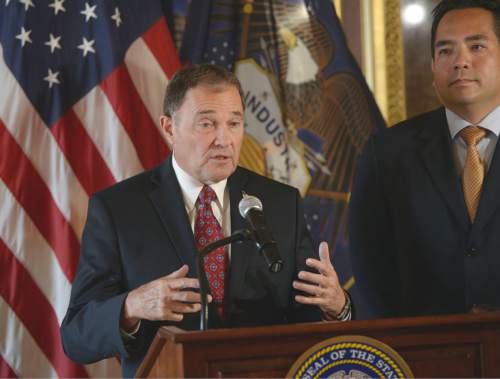This is an archived article that was published on sltrib.com in 2014, and information in the article may be outdated. It is provided only for personal research purposes and may not be reprinted.
Utah's economy is booming again, growing at a clip that will provide legislators and Gov. Gary Herbert more additional money to spend than they have had since 2007, before the Great Recession.
All told, state leaders will have an additional $638 million to pay for an array of programs, including education, roads, social services, prisons and more.
The numbers come ahead of Herbert's budget proposal, which is scheduled for release Thursday. The governor attributed the robust forecast to the state's thriving economy and pro-business policies.
"Our commitment to conservative fiscal principles and to cultivating the nation's most business-friendly environment will now allow us to make sound investments to continue our economic expansion and enhance our quality of life," the governor said in a statement.
Of the $638 million total, about half — $325 million — is available for new or ongoing programs or salaries. The rest will be reserved for one-time expenditures, items such as road or building construction or equipment purchases.
The vast majority of the surplus revenue comes from increased personal and corporate income-tax collections. Under the Utah Constitution, those funds go to public schools and colleges.
The revenue forecast has jumped dramatically, coming in 50 percent higher than the most optimistic projection given to legislators in October.
But Republican legislative leaders were quick to try to tamp down expectations and made clear that the new revenue might not translate to spending increases.
House Speaker-elect Greg Hughes, R-Draper, said Utah was one of the hardest hit states during the recession. But he said it also was one of the quickest to recover, he believes, because it had been conservative with its spending and had money socked away in its Rainy Day Funds.
Today those reserves aren't where leaders would like them to be, Hughes said, and it makes sense during the good times to prepare for the bad.
"We don't think the state is as well-situated [for a downturn]," Hughes said, "and we want to be."
So, on Tuesday, legislative leaders voted to take more than a third of the additional ongoing money off the table for programs — a hedge against future economic volatility. They reserved another $30 million until the end of the session and directed budget subcommittees to cut their allocations by 2 percent across the board.
Senate Budget Chairman Lyle Hillyard, R-Logan, said the goal is to ensure the money the state already is spending is being used as efficiently as possible. If savings can be found, it gives lawmakers more flexibility when it comes to moves such as bolstering education spending.
It also sends a signal to advocates and groups asking for money that legislators aren't going to tolerate a free-for-all.
"We put enough of a kibosh on that," Hillyard said.
The longtime Logan lawmaker is encouraged by the budget forecasts.
"It gives us a little bit of money to do some things we haven't been able to do for a little while," Hillyard said. "But mark my words: When we get to the end [of the session], we won't have enough money."
Hughes said that, given the surplus in tax collections, it's unlikely that a tax increase would get serious consideration, although there could be some debate about shifting how taxes are collected and a look at the dwindling gas-tax revenues.
There are a series of demands driven by population growth that lawmakers will have to address.
For example, nearly 8,000 new students are expected to enter Utah schools next year. It is the smallest rate of growth in more than a decade, but will still cost an additional $54 million.
Add the new education costs to growth in programs such as Medicaid, higher costs for health insurance for state employees, paying to maintain buildings, and giving a small pay raise to state employees and teachers, and lawmakers could burn through $178 million right off the top.
Twitter: @RobertGehrke



